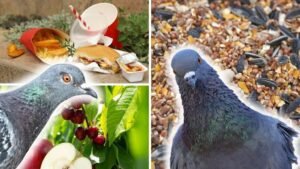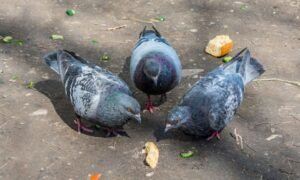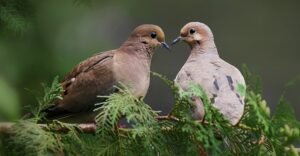what do pigeons and doves eat?

Pigeons and doves eat a variety of foods, including seeds, grains, fruits, berries, greens, vegetables, nuts, and plants. They may also eat insects, snails, earthworms, spiders, and lizards if they are hungry enough.
Here are some foods you can feed pigeons and doves:
Seeds
Pigeons have traditionally been fed all-seed diets, but commercially available seed mixes may be high in fat and low in nutrients. Mourning doves eat almost entirely on seeds, especially hemp, wheat, foxtail, corn, pigweed, and ragweed.
Grains
Pigeons and doves eat cultivated grains and wild grasses.
Fruits
Pigeons and doves eat berries, melon, and kiwi.
Vegetables
Pigeons and doves can eat most bird-safe vegetables, such as carrots, broccoli, snap peas, dandelion greens, kale, cauliflower, lettuce, spinach, and bell peppers. You should finely chop or grate the vegetables because pigeons and doves can’t chew their food well.
Other
Pigeons and doves also eat bread crumbs and littered foods, and they need grit for digestion. You can also add a small amount of fruit to their diet.
You should also provide pigeons and doves with plenty of clean, fresh water at all times. If you’re feeding pet pigeons and doves, you can also consider adding a high-quality avian vitamin and mineral supplement to their food.
What Do Pigeons Eat?
Broadly, the pigeons that are prevalent in our cities and urban areas are not picky eaters and will consume almost anything, from insects to discarded food scraps. In contrast, wild pigeons will eat whatever is naturally available to them. This diet encompasses insects like worms and ants, along with seeds, fruits, berries, and vegetables.
Although they initially inhabited coastal areas, forests, gardens, and cliffed regions, these pigeons have since adapted to prosper in our human settlements, particularly in towns and cities.
A Closer Look At What Wild Pigeons Eat
In contrast to city pigeons, wild pigeons benefit from a significantly healthier diet. Living in forests and coastal regions, wild pigeons rely solely on the natural resources available around them. Their typical diet includes:
- Berries
- Seeds
- Grains
- Nuts
- Vegetables
- Grit (for digestion purposes)
- Plants
- Vegetation
- And fresh water
Wild pigeons are primarily herbivores, but they can deviate from their plant-based diet when needed. When extremely hungry, pigeons may consume a variety of items, including insects, spiders, and lizards. Their dietary needs for protein and fat can be met through nuts, fruits, or even other animals. While they don’t have a specific favorite food, they tend to prefer seeds, nuts, and vegetables above all else.
Should I be concerned about what my pigeon or dove eats?
Adequate nutrition is frequently overlooked yet essential for pet birds. It’s important to consult your veterinarian about your bird’s dietary requirements. Many owners mistakenly believe they are providing a suitable diet for their pigeon or dove, but this is often not the case.Inadequate nutrition is a prevalent cause of numerous health issues in birds. The well-being of birds is closely linked to their diet, making it crucial for bird owners to be informed about proper bird nutrition.Bird owners should keep in touch with their avian veterinarians to remain updated on their birds’ nutritional requirements.
What do wild pigeons and doves eat?
Wild p Pigeons and doves consume an assortment of grains, seeds, greens, berries, and fruits. Occasionally, they also eat insects, snails, and earthworms.
What should I feed my pigeon or dove?
Seeds
Pigeons have historically been given diets consisting entirely of seeds.Commercial seed mixes for pigeons typically include 2-5 different types of seeds. However, these seeds are often high in fat and lack essential nutrients, differing significantly from the seeds that wild pigeons consume. eeds are also lacking in calcium, vitamin A, and various other nutrients.Often, these seed mixes are provided as the sole source of nutrition, resulting in poor health and potentially reducing lifespan.Seeds can be included in a pigeon’s diet, but they should not make up the whole diet.
There are pigeon diets available that contain some seed plus grains. Some are also Enhanced with brewer’s yeast, vitamins, and minerals. There are various diet plans for both active birds and resting birds. and breeding birds.”The issue with providing pigeons and doves” Diets that include seeds typically involve selectively consuming only the seeds. and will not receive any of the nutritional benefits from the pellets.
” Seeds can be included in a pigeon’s diet, but they should not make up the entire diet. .”
Pelleted Diets
Various commercially produced pelleted diets are available in different colors, shapes, and sizes to cater to the nutritional needs of all birds. Unlike parrots, which have strong, curved beaks, pigeons and doves possess small beaks and fare better with small-sized pellets. Hand-reared chicks are typically the easiest to transition to a pelleted diet. Ideally, pellets should make up about 50% of a pigeon’s diet, supplemented with small quantities of seeds and fresh produce.
Fruits and Vegetables
Finely diced vegetables and herbs, plus smaller amounts of fruit, should be offered as part of a pigeon or dove’s daily diet. Pale vegetables, with a high water composition (i.e., Iceberg or head lettuce and celery provide minimal nutritional benefits. and should not be offered. It has been reported that avocados may be potentially harmful.should not be given to birds.
Thoroughly washing fruits and vegetables is necessary to eliminate any chemical residues.Unlike hook-billed parrots, pigeons and doves have small beaks, so vegetables and fruits should be shredded or cut into small pieces. tup into tiny, manageable pieces. Fruits and vegetables should be offered in a separate dish from pellets and other foods. If your bird appears to develop a particular fancy for one food item, reduce its volume, or stop feeding it temporarily to promote the consumption of other foods.
Water
Fresh clean water must be available at all times If the quality of your tap water is questionable, you may want to use bottled water instead. Make sure to wash your dishes thoroughly with soap and water daily.
What about people food?
Generally speaking, any healthy and nutritious food that you and your family consume can also be given to your bird, but only in very small amounts.Adhere to the aforementioned general recommendations. Certain birds take pleasure in a very tiny Occasionally provide a small quantity of lean cooked meat, fish, eggs, or cheese. Dairy products should be consumed sparingly, as birds cannot tolerate lactose. Junk food, Chocolate, salty foods like chips and pretzels, pCorn, along with products that contain caffeine or alcohol, can be harmful to birds and should not be given to them.
Will my bird have any different needs throughout its life?
Birds that are very young, stressed, injured, laying eggs, or raising chicks might have unique needs. There are specially designed pelleted foods for birds with particular nutritional needs. It’s important to consult your veterinarian about these situations.
Does my pigeon or dove need extra vitamins, minerals or amino acids?
Your A veterinarian can assist you in evaluating your bird’s diet and its particular needs. Overall, birds whose diets primarily consist of pellets typically do not require additional supplements. Certain vitamins and minerals become particularly important at different stages of a bird’s life. For instance, calcium is crucial during egg laying. If your bird requires additional calcium, supplements are available. bird is considered to be lacking.
” Overall, birds that primarily consume pellets as their main food source typically do not require additional supplements. .”
Does my pigeon or dove need gravel or grit?
There is ongoing debate about whether gravel is necessary. or grit. It was once It was thought that grit was essential for the mechanical processing of food in the gizzard, helping with digestion.Unlike parrots, which peel off the seed hull before consuming the seed kernel, pigeons and doves swallow seeds whole and…appear to manage well without determination.To assist in the digestion of food, pigeons and doves may be “provided a small quantity of crushed eggshell or” digestible oyster shell Grit, which can additionally act as a calcium source. Many birds will, in fact, have gastrointestinal problems if they overeat grit Therefore, only oyster shells that are digestible should be used. offered.
What pointers should I remember about feeding my pigeon or dove?
- Make sure to keep track of the daily food intake for each bird.
- Offer fresh water every day.
- Provide fresh produce daily.
- Clean all food and water dishes daily.
- If a bird turns down food on one day, it might accept it on another day. Don’t give up! Keep offering it!
What Do Pigeons Eat in Urban Areas?
Pigeons have effectively adjusted to our urban surroundings, managing to nest, feed, and flourish in our most bustling towns and cities. Nevertheless, their diet and living conditions aren’t as favorable as those of wild pigeons. Urban pigeons survive on whatever they can scavenge, consuming a wide range of items including discarded or dropped food. This diet often includes:
- Bread
- Pasta
- Meat and fish
- Confectionary (chocolates, sweets, etc.)
These types of pigeons can consume our food because they’ve adapted and evolved over many years. It’s quite common to spot pigeons rummaging through garbage bins when they’re in dire need of food. Usually, this is harmful to them since they’re probably ingesting contaminated food that could be deadly.
No matter the variety of pigeon, their diets are quite similar.
What Do Baby Pigeons Eat?
For baby and newborn pigeons, it’s vital for their diet to contain a substantial amount of protein to support their initial growth. While adult pigeons don’t need as much protein, macronutrients are essential for the muscle, tissue, and physical development of young pigeons. Without these necessary nutrients and proteins, baby and newborn pigeons may experience a protein deficiency.
At this stage, their diet consists exclusively of milk produced by their parents. This specific type of milk, called crop milk, is produced by both male and female pigeons. This distinctive feeding period lasts for just about a week. Without the vital nutrients provided by the crop milk, baby pigeons are unlikely to survive, and their digestive systems won’t develop sufficiently to handle the adult pigeons’ diet.
Baby Pigeon Diet – After One Week
In about a week or even sooner, baby pigeons can start eating other types of food in addition to their primary diet of crop milk. It is not until roughly the third week that they no longer need crop milk and can fully digest adult pigeon food. During the early stages, the crop milk provided by their parents helps them digest crushed foods.
Baby Pigeon Diet – After One Month
After a month, baby pigeons will be ready to eat other types of food safely. However, before they can efficiently find and eat their food, they need to be able to safely leave their nests and learn to fly.
What Can Pigeons Not Eat?
In addition to the spoiled food they scavenge from dumpsters in urban areas, some particular foods can be detrimental to pigeons’ health. Pigeons possess a relatively intricate digestive system, rendering them unable to properly process certain foods. These harmful foods include:
- Foods and beverages that are high in sugar can negatively affect pigeons, potentially causing adverse reactions and even leading to diabetes.
- Apples – the fruit itself is generally harmless to pigeons. However, if pigeons consume apple seeds, which contain cyanide, it could lead to gut irritation.
- Chocolate contains theobromine, a substance found in nearly all types of chocolate, which is harmful to pigeons.
- Foods high in salt (or salt itself) – salty foods contain sodium, which can be difficult for pigeons and other birds to digest.
- Avocados contain a substance called persin, which is poisonous to pigeons.
Can Pigeons Eat Rice?
The belief that pigeons and other birds should not be given rice is a misconception. Although feeding rice to pigeons is not recommended due to its lack of nutritional benefits, consuming rice does not harm them. Both cooked and uncooked rice are safe for pigeons to eat.
Pigeons Are Able to Eat Almost Anything
Rock pigeons, wood pigeons, homing pigeons, and doves all have very similar diets. As long as they get the right nutrients while they are growing up, they should develop properly.
If you’re having any problems with pigeons or other birds,Contact one of our pest control specialists today. for further help and assistance.
Greetings from the Petworled website management, we wish you success and see you in another article on our website.
















